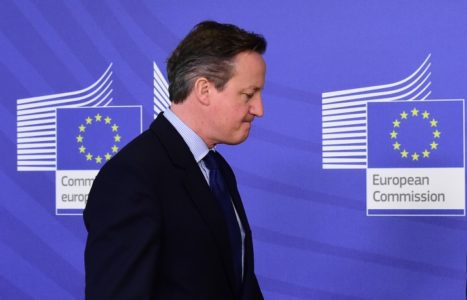And the world seems to disappear
What’s up with David Cameron?

Former UK PM David Cameron (Politico)
Former UK Prime Minister Tony Blair once referred to the UK Conservative party as a party of fox hunters. This stereotypical view of the UK Tories was aiming to denounce the main right-wing party in the UK as a party of the old and wealthy, out-of-touch white males. It is also the party that went from campaigning for the European Community into deep Euroscepticism. After the Margaret Thatcher years, her deputy John Major took over the PM role. With a twist of luck and catastrophic mistakes from the Labour party, he managed to achieve an election victory in 1992.
However, Major was still perceived as an upper-class banker with oversized suits and granddad glasses. To respond to that, Labour elected a young and charismatic leader, the aforementioned Tony Blair. His motto Cool Britannia, which went hand-in-hand with the British pop culture of the 1990s, aimed to appeal to young voters that did not have much connections to the trade unions and old school Marxist rhetoric. The Tories did not have an answer for that. After three consecutive Parliamentary elections losses (1997, 2001, 2005), they decided to take the same recipe and to elect the young and socially liberal David Cameron as their leader. On the first, that was a winning move.
However, things did not go the way they were initially planned, resulting in disastrous political gambles that brought us the situation where we are today, unaware of how Brexit will look and whether the wounded Tory-led UK government can survive in a coalition deal with the Northern Irish DUP. But the focus today is on David Cameron. His first problematic decision regarding the EU was pulling the Tories out of the EPP Group in the European Parliament (Back then it was EPP-ED) and forming the ECR party/group, moving to the right with some Eastern European Eurosceptic forces.
This brought some highly unpredictable alliances and severely crushed the impact of the Tory party on the EU politics level. It was basically a move to satisfy the Eurosceptic parts of the Conservative party, to whom David Cameron would tailor his EU policies throughout the years. Cameron barely survived the political gamble he made with the Scottish referendum, only by uniting all of the pro-UK political forces, but he did not survive Brexit. His voice in the Remain campaign sounded completely unconvincing, having in mind so many years of spreading Euroscepticism.

David Cameron campaigning for Remain (Newsweek)
Nowadays, David Cameron is not that often under the spotlight, as we obviously have the trio Theresa May, Boris Johnson and David Davis for that, but he is far from being forgotten. Some media pundits have been pushing him as a potential successor of Jens Stoltenberg as the Secretary General of NATO, although cynics could joke that with his gambles he could potentially push some country out of the organisation. At the same time, he was a recent guest at the World Economic Forum in Davos, which is often viewed by left-wingers the same way as the Tory party.
He spoke there in his role as a former Prime Minister, while currently doing several jobs and trying to sound philanthropic on social media. Recently, The Guardian reported that he is also working on his memoirs. Mind you he is only 51. On Brexit, he said that the vote was a mistake but not a disaster, and believes it did not turn out as bad as expected. It is still unclear on which parameters Cameron is giving these statements, having in mind that it is too early for Brexit conclusions.
Finally, it is important to stress that many people are worrying about the outcome of Brexit. By the looks of things, David Cameron won’t have to worry about it. He will get his high consultancy/lobby salaries one way or another. At the same time, he left his Conservative party in a bad shape, suffering from internal fights, coalition struggles and a clear lack of vision. Not to mention they are lacking support from young people, which reverts their image back to the 1990s.
